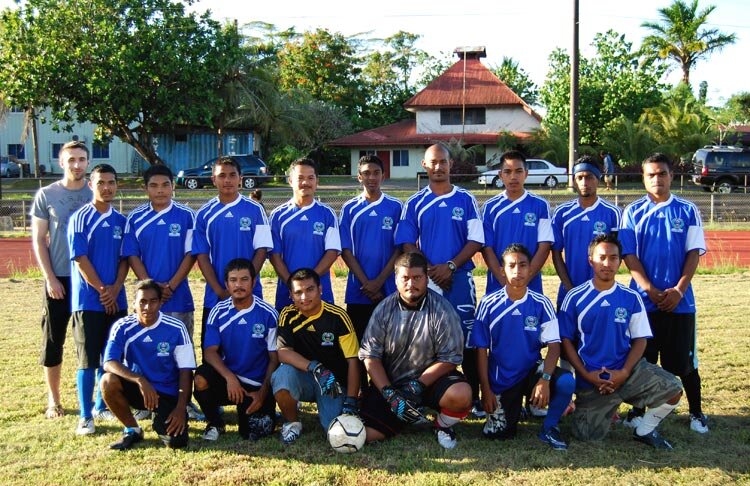To the Ends of the Earth
Paul Watson’s 2012 book Up Pohnpei tells the story of his remarkable stint as football manager in the Federated States of Micronesia around a decade ago. Dom Smith of englandfootball.org explains how that experience has led to further adventures, and how Watson now hopes to support Rohingya refugees in Bangladesh.
April 2021
Most people strive to hold down a steady job in their home country. For some, however, that is not nearly adventurous enough. Adventure might mean leaving behind a job working on a football TV show to become manager of an obscure national team in the South Pacific, and then flying to Mongolia to start up a football club from scratch. Perhaps they might then organise an unofficial edition of the World Cup, almost single-handedly. In actual fact, there is no perhaps about it, for this is the life of Paul Watson – the failed footballer from Bristol who was unwilling to limit himself to a career in England.
“Now I look back at it, it was very brief,” Watson admits about his playing career. “I gave up eventually, but I should have given up at 20. I clung on in there. The highest level I ever got to was training with Tooting and Mitcham reserves. It was very brief. I was in there for a pre-season and then I got chucked out.”
Meanwhile, Watson began work on one of the UK’s best-loved football shows, Channel 4’s Football Italia. “The job sounded great, but it wasn’t really what I’d envisaged. So many people said, ‘That’s a dream job.’ But actually, I was doing twelve hours a day in front of a computer in my own house translating things from Italian to English. I loved football but couldn’t really find a way through journalism; it wasn’t what I thought it was going to be. I think that left me quite susceptible to the idea of doing something more directly in football.”
And work in football more directly than he ever had done before is exactly what Watson did next. “When the Pohnpei thing came up, in a sort of feature film of my life I would have gone to Pohnpei thinking I could play for their national team. We cooked it up as two mates. We said: ‘Wouldn’t it be great to do that?’ But the reality is, by the time we even got to point where we met someone to talk about it – the guy who ran their FA had moved to London by complete fluke – I kind of knew that I was thinking about coaching. When he said, ‘Actually there isn't a team there, but could you set one up?’ I thought: ‘Well that’s something that seems a bit more worthwhile.’
“There is also the moral thing. However much it’s fun in theory, could I go to a remote country and play for their national team? The reality is it’s a pretty exploitative idea; it’s a little bit colonial.” And so, Watson and his friend Matt Conrad went out to manage and coach in the Federated States of Micronesia, a tiny Pacific nation made up of four island states. They took charge of the team representing the second largest state, Pohnpei, who had previously played only a handful of matches. Watson and Conrad were not paid for the trouble, and at just 24 years of age, Watson was the self-styled youngest manager in the history of international football.
Paul Watson (far left) and the Pohnpei football team
Watson was unlikely to gain any clout from this. But he was both aware of and totally resigned to that fact. This is a man who had found himself living and coaching in what he calls a “ridiculously niche country” because that is where his passion lay. “My brother and I would play in the garden as kids,” Watson recalls. “One of us would be, I don’t know, the Seychelles, and one would be Guam or something. All of the other kids were Man United and Chelsea!”
Watson’s next role was also both well within and far outside his comfort zone – from the obscure unknown to the obscure unknown. “Mongolia was a weird one. I came back from Pohnpei and understandably that whole thing didn’t leave me in any obvious place career-wise. It wasn’t like there was a natural progression…
“I went out of football for a while; went out of that world. Then, out of the blue, I got a call from this guy who was setting up a team in Mongolia. He actually ran a sort of breakaway league because the league there was so corrupt. He wanted someone to run a flagship team that was trying to bring homegrown talent up, because one of the other problems they had — and still have — is a load of players just come in from abroad, win the league and then disappear. There’s not a lot of investment in young players. When he told me about what he needed, it did sound like a pretty exciting mission. But I wasn't exactly fending off offers! “I thought: ‘What's the worst that could happen?’ And the worst could have probably been quite bad. But it was somewhere between the worst and the best – a really weird experience.”
Bayangol FC, Watson’s club in Ulaanbaatar, Mongolia
In the years since, Watson has organised the 2018 edition of the CONIFA World Cup – the largest competition for unofficial non-Fifa national teams, including the likes of Tuvalu, Northern Cyprus and Tibet. More recently, he moved his attention to the Rohingya people – a stateless Muslim minority who have been driven out of Myanmar by the country’s ruthless military junta. They now live in Kutupalong refugee camp in Bangladesh – the largest refugee camp in the world. While the Covid-19 pandemic has caused the event to be “indefinitely postponed”, Watson still hopes to bring a World Cup-style tournament to the camp in the next couple of years. It will surely provide a welcome distraction in a place so devoid of hope and happiness.
“The Rohingya have been the victims of a genocide in Myanmar. The Myanmar army has been rasing villages of Rohingya and killing thousands and thousands of Rohingya. Somewhere between 1 and 1.5 million Rohingya have poured across the borders to flee into Bangladesh. Kutupalong is the biggest, but there are several massive refugee camps. That’s where a lot of the Rohingya have ended up; others have tried to make it to Malaysia on boats and risked their lives to do that.
“It’s just a horrific catastrophe. A lot of people hear about it in the news and it’s kind of impossible to imagine the scale of it. I can’t quite get my head around it, but I’d say it’s almost unprecedented. It’s a very fraught life because conditions in the camps are terrible – they’re overcrowded, there’s a lack of sanitation and a lack of opportunity, there are problems with crime. Simply surviving there is really difficult. There’s also the terror of being forced back to the country from which they fled.
The Kutupalong refugee camp near Cox’s Bazar, Bangladesh
“Because of my work initially with CONIFA, a lot of the teams I’d dealt with were displaced or persecuted peoples. Obviously, CONIFA is working with people who can’t fit into the existing system. We’d worked with a Rohingya team in Malaysia, but I’d wanted to get in touch with someone in Bangladesh and really struggled to find someone. I eventually found a filmmaker from the UK who has done lots of work with Rohingyas – followed them from the very beginning of the genocide.
“He put me in touch with the FA; there is an FA in Kutupalong which is trying to run events. We would be in touch day in, day out, ascertaining the situation. They were going to set up a 16-team tournament, which would be the first formal, large-scale tournament in the camps. We had set the date for February 2020. Everything was on track; the tournament was going to start in ten days’ time. Coronavirus had crept into the consciousness and got worse and worse – and we cancelled it. Well, postponed it…
“The idea for me was that this tournament would be sort of a launchpad. I was going to go out, meet the key people involved and get a real on-the-ground feel for what we were doing and what we could do to turn this into a bigger thing. A chance to produce a bigger development opportunity for Rohingya footballers. Then the decision had to be made to postpone – it just felt irresponsible, socially. Especially with an environment like that, you’ve just got to be so cautious. Even after things open up again, we’re going to have to give some considerable thought, partly because with games you do attract thousands of people sometimes. So, it’s indefinitely postponed.”
Pandemics aside, the kid who once ran around the garden pretending to represent some tiny archipelago is now organising football tournaments for victims of global atrocities. It is quite the transformation. Now aged 36, what’s next for Watson in his crazy football journey? “This nonsense life, it doesn’t make any sense! I still love to work with the teams. There are potential tournaments for this year or for 2022 that we’re looking at. But I love just getting in touch with teams and seeing what they need.
“There’s nothing set in stone yet but there will be at least two or three projects to see me through 2021 and 2022, as well as the Rohingya work. So, I’m keeping myself busy.” The spontaneity of Watson’s life dwarfs any attempt at documenting it coherently. He’s fully aware it’s an unorthodox life he leads: “You think it’s hard writing it? Try living it!”
Words: Dom Smith | Imagery: Paul Watson; Russell Watkins





